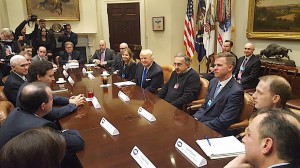
The Big Three automakers would like NAFTA to remain status quo; however, the Trump Administration is renegotiating the deal this summer.
The Trump Administration has begun the formal process required to open the renegotiation of the North American Free Trade Agreement this coming summer.
President Trump notified Congress this week of his intent to renegotiate the North American Free Trade Agreement. The talks with Canada and Mexico will begin “no earlier than August 16, 2017,” U.S. Trade Representative Robert Lighthizer said in a letter to Congress.
During the 90-day countdown, USTR will consult with “Congress and American stakeholders to create an agreement that advances the interests of America’s workers, farmers, ranchers and businesses,” he said.
Automakers, who have close ties to U.S., Mexico and Canada, are watching the negotiations with some trepidation since automakers have signaled in a variety of ways that the prefer the status quo, which during the past 25 years has led to the creation of networks of suppliers and production that span North America.
(Mexico trade chief says NAFTA redo must benefit everyone. Click Here for the story.)
Executives have said changing various facets of NAFTA or a “border tax” would drive up cost, reduce sales and ultimately make the North American industry more vulnerable to international competition.
“NAFTA has helped to boost the global competitiveness of the U.S. auto industry sector and we support modernizing the agreement in ways that will further strengthen North America as a manufacturing powerhouse, stimulate economic growth and drive job creation.
“As the renegotiation process begins, we encourage the Trump administration to seize this opportunity to work together with Canada and Mexico to support strong and enforceable currency manipulation disciplines in trade agreements and encourage the global acceptance of vehicles built to U.S. auto safety standards.
“This initiative presents a significant opportunity to update NAFTA in a way that will increase the export of more American vehicles and auto parts, and grow the number of high-quality and high-paying American jobs supported by such exports,” said the American Automotive Policy Council, which represents General Motors, Ford and Fiat Chrysler Automobiles N.V., in a statement.
As it stands, the Trump administration’s efforts to renegotiate NAFTA are hardly guaranteed with success at this point largely because of opposition from within the Republican party. For example, Lighthizer’s appointment has trade representative was held for weeks because Sen. John McCain (R-Ariz.) had opposed the appointment. McCain said Lighthizer, a critic of free trade, didn’t understand how important NAFTA has been for economy of Arizona.
(Trump backs off on threat to pull out of NAFTA. Click Here to learn why.)
Lighthizer was eventually confirmed but skepticism of revising NAFTA with the ranks of Republicans in U.S. Senate who traditionally supported free trade. Republicans from farm states, a substantial bloc in the Senate and House of Representatives, also have raised concerns about the possibility Mexico could retaliate by from buying corn and other grains other countries in Latin America instead of the U.S.
Mexican trade officials also have said they are unwilling to rewrite NAFTA without some major concessions on the part of the U.S.
The other problem confronting negotiators, who will meet in late summer, are also facing some potentially tight deadlines notably the start of the Presidential campaign in Mexico in 2018. NAFTA and Trump have become major issues in Mexican are bound to be major issues in the Presidential campaign as well.
Trump, while harshly denouncing NAFTA during the 2016 campaign, has taken a somewhat softer line since taking office while making plain that he still thought it was a bad deal for American workers.
Last month, Trump backed off a proposal to have the U.S. withdraw from NAFTA unilaterally. The idea set off alarms in Washington, Ottawa and Mexico City, according to the New York Times. The president of Mexico and the prime minister of Canada both called Trump to warn against such a precipitous step.
(Trump threatens Canada, Mexico, with new border tariffs. Click Here for the story.)
“I decided rather than terminating NAFTA, which would be a pretty big, you know, shock to the system, we will renegotiate,” Trump later told reporters at the White House. He added that he was still ready to pull the United States out of the deal if he could not rework it to his satisfaction.
